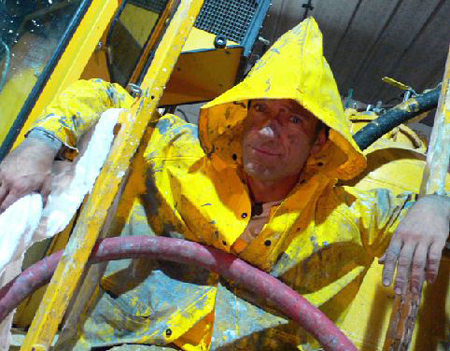Work Habits
I never tire of hearing how professionals work. I want to know what their daily habits are, the tricks of their trade, the unexpected hurdles they encounter, the little things they do that help them achieve glossy, sharp work. This is the chief draw of the Discovery Channel hit show, Dirty Jobs. You get the inside scoop on jobs you don’t want to do, and you learn how the pros make it look so easy.

But my interest goes beyond dirty jobs to almost any job done well. Tell me how you you do your thing. I am particularlly interested in what happens when things don’t work out. How do carpenters deal with mistakes? What happens when designers’ designs fail? Or when the prototype doesn’t fly? How do you back up, or get unstuck?
Occasionally a magazine will interview a celebrity creator and he or she will divulge a bit about how they work. One guy has been collecting these bits and regularly publishes the snippets. The following were snipped from his the subsection of his site, How We Work. These are only a hit of what a great clearinghouse of work habits would be.
Anthony Trollope, Author:
He woke in darkness and wrote from 5:30 A.M. to 8:30 A.M., with his watch in front of him. He required of himself two hundred and fifty words every quarter of an hour. If he finished one novel before eight-thirty, he took out a fresh piece of paper and started the next. The writing session was followed, for a long stretch of time, by a day job with the postal service. Plus, he said, he always hunted at least twice a week. Under this regimen, he produced forty-nine novels in thirty-five years. Having prospered so well, he urged his method on all writers: ‘Let their work be to them as is his common work to the common laborer. No gigantic efforts will then be necessary. He need tie no wet towels round his brow, nor sit for thirty hours at his desk without moving,—as men have sat, or said that they have sat.’
Walter Murch, Film Editor:
One of the most important things he thinks every editor should do when chosing an out point for a shot, whatever their approach, is what he calls a ‘flinch’. He rolls the shot and then hits the editing button when it feels instinctively right to turn away from that shot. When he does this he logs the frame (or marks the neg with a grease pencil) where he stopped the clip, repeats the process and if he catches the same frame again he knows that was the right cut point. If he is out even by a couple of frames (there are 24 frames in a second of film), he knows that it wasn’t quite right and he needs to look at that edit decision again. “It’s almost an involuntary flinch, an equivalent of the blink of the eye. That flinch point is where the shot will end,” he says. “It’s very similar to gunslinging. That’s the reason I stand when I edit.”
Benjamin Zander, Conductor:
At the start of a new term, Zander tells his students that they will all get an A at the end of term if they now write him a post-dated letter explaining what they did to earn that A. This tends to incentivise them to earn the A. “Sometime during the next two weeks, you must write me a latter dated next May, which begins with the words, ‘Dear Mr Zander, I got my A because…’, and in this letter you are to tell, in as much detail as you can, the story of what will have happened to you by next May that is in line with this extraordinary grade.”


